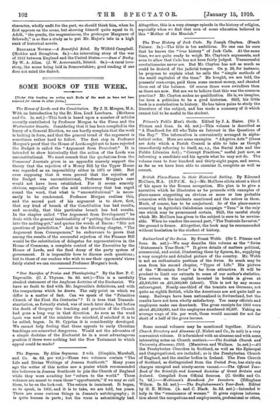SOME BOOKS OF THE WEEK.
[Under this heading we notice such Books a/ the reek aa hiss not hen Maud for raviolis in other forms,]
The House of Lords and the Constitution. By J. H. Morgan, M.A. With an Introduction by the Rt. Hon. Lord Loreburn. (Methuen and Co. ls. net.)—This book is based upon a number of articles recently contributed by Professor Morgan to the Times and the Westminster Gazette. Considering that it has been compiled in the hurry of a General Election, we can hardly complain that the work is lacking in form, and that the general trend of the argument is sometimes rather bard to follow. The first step in Professor Morgan's proof that the House of Lords ought not to have rejected the Budget is called the "Argument from Precedent." It is intended to show historically that the action of the Lords was unconstitutionaL We must remark that the quotations from the Commons' Journals given in an appendix scarcely support the theory that the rejection of a Money Bill by the Upper House was regarded as an impossibility either in 1671 or 1860. But even supposing that it were proved that the rejection of the Budget was unconstitutional, Professor Morgan's case would not have been established. For it seems scarcely obvious, especially after the arid controversy that has raged round the word, that what is "unconstitutional" is neces- sarily to be condemned. Professor Morgan realises this, and the second part of his argument is to show, first, that any kind of breach of the Constitution has bad results, and secondly, that this particular breach has bad results. In the chapter called "The Argument from Development" he deals with the general inadvisability of "putting the Constitution into the melting-pot," and quotes the words of Bacon : " Stir not questions of jurisdiction." And in the following chapter, "The Argument from Consequences," he endeavours to prove that among the results of the successful rejection of the Finance Bill would be the substitution of delegates for representatives in the House of Commons, a complete control of the Executive by the House of Lords, and the final decay of the party system of government. It is impossible here to discuss such questions ; but to those of our readers who wish to see their opponents' views fairly stated we can recommend Professor Morgan's book.






































 Previous page
Previous page